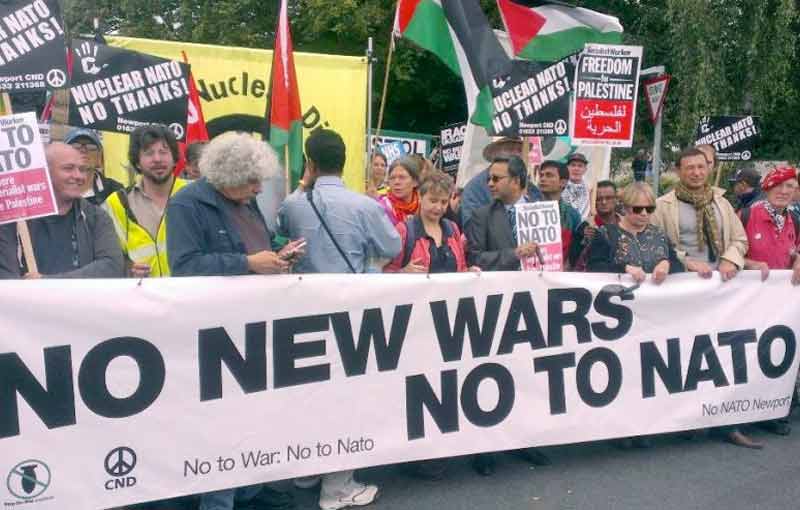 Supporters take part in the 'No to NATO' protest march in Newport, south Wales, Saturday, Aug. 30, 2014. Photo from: AP Photo/Benjamin Wright, PA Wire
Supporters take part in the 'No to NATO' protest march in Newport, south Wales, Saturday, Aug. 30, 2014. Photo from: AP Photo/Benjamin Wright, PA Wire
Lindsey German: as these masters of war meet again, we will make our voices heard to prevent further bloodshed and atrocities in Ukraine and Iraq
There is something eerily familiar about the scenes. Steel fences rising like medieval fortresses, fleets of limousines, the hum of helicopters above, policemen who can’t tell you directions to the station because they have come from hundreds of miles away to swell the estimated 10,000 police numbers.
It’s another summit of world leaders, this time Nato – the North Atlantic Treaty Organisation – which is congregating in the luxury Celtic Manor hotel near Newport, south Wales, this week.
Sixty world leaders will swig champagne and work their way through several banquets. But the purpose of the summit is deadly serious and dangerous. Its stated aim is to increase the amount that each Nato country spends on defence to at least 2% of every country’s GDP. It will also agree further military operations in eastern Europe and in the Middle East. Billed months ago as a summit to manage the withdrawal of (some) Nato troops from Afghanistan, that issue has been consigned almost to a footnote.
The assassination of a US general there last month, and the return of the Taliban to the Sangin province, will be little remarked upon. Nor will the disastrous state of Libya, three years after Nato’s supposedly successful intervention there. Instead, talk will focus on two areas: further intervention in Iraq and possibly Syria to halt Islamic State, and further expansion of Nato in eastern Europe.
A week of protest in Newport and Cardiff has highlighted opposition to all of these policies and many more, from Trident and nuclear weapons to Palestine; from arms sales to drone attacks. Hundreds have joined the peace camp in Newport. Many of them see Nato as a force for war, not peace, and consider its very existence to make war more likely.
Nato was a creature of the cold war. When that ended and the Soviet Union collapsed, Nato’s east European counterpart – the Warsaw pact – was disbanded. Nato instead embarked on a series of “out of area” operations from Kosovo to Afghanistan. Assurances were given that Nato would not expand eastwards beyond the now reunified Germany, and that there would not be significant numbers of Nato troops stationed in eastern Europe.
Both of those agreements were worthless. As the EU expanded eastwards, with its neoliberal message of privatisation and free markets, membership of Nato and greater spending on the military was seen as part of the package. Nato member states now extend to the Russian border.
The conflict in Ukraine has everything to do with this process. Nato plans exercises in Ukraine, and what amounts to permanent bases in Poland and the Baltic states. By backing the Ukraine government’s bombardment of the eastern part of the country, and largely ignoring the humanitarian crisis which has arisen there, Nato has made war with Russia a real threat.
The danger is that this week’s summit will also increase the pressure for war in Iraq. It seems almost unbelievable that none of the lessons of previous wars have been learned. More bombing of Iraq will do nothing to stop Isis.
Perhaps we should instead look at where Isis came from in the first place. Funded by Saudis and Qataris, joined by many people from the Free Syrian Army who were paid for and aided by the US and its allies, allowed across a 500-mile open border by Turkey to fight Syria’s President Assad, Isis could not have grown without this help.
The determination to pursue policies which have so obviously failed in the past is an unfortunate hallmark of the Nato leaders. They describe Isis as barbaric, which is true, but are silent on their own barbarism in Iraq, where hundreds of thousands died.
The protesters in Newport and Cardiff this week are determined to make their voices heard, despite the millions being spent on protecting these masters of war. And who can honestly deny that the world would be a safer place if we had been listened to in the past?

